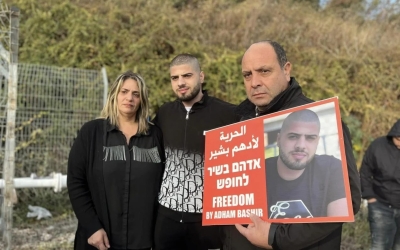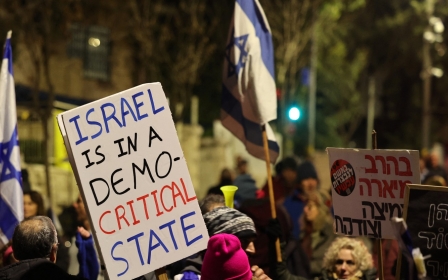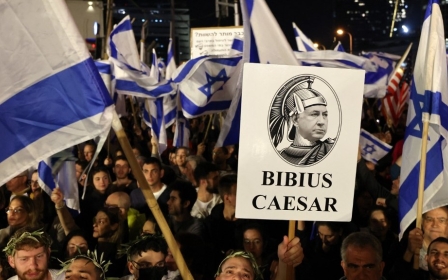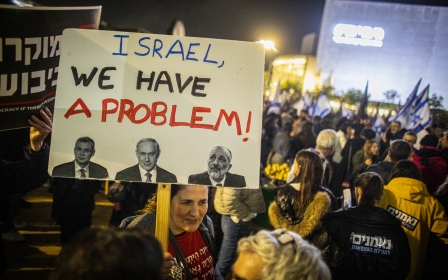Why 1948 Palestinians refuse to protest against Israel's judicial reforms

While hundreds of thousands of Israelis were mobilising against Israeli Prime Minister Benjamin Netanyahu’s recent judicial reforms, the Arab leadership in Israel has been reluctant to join the protests against eroding the power of the Supreme Court.
Historically, the Israeli regime has used the courts and various legal manoeuvres as part of a long process of stripping the Palestinians in Israel of their rights.
A state that explicitly defines itself as Jewish, rather than a state for all its citizens, cannot guarantee fundamental democratic rights and equal citizenship to its minority
A state that explicitly defines itself as Jewish, rather than a state for all its citizens, cannot guarantee fundamental democratic rights and equal citizenship to its minority, and their integration into state institutions will be always conditional.
And, with most of the current Israeli legislators representing far-right nationalistic and religious parties, not only will the civic status of Palestinian citizens be restricted, but their entire existence in the "Jewish" state will be threatened.
New MEE newsletter: Jerusalem Dispatch
Sign up to get the latest insights and analysis on Israel-Palestine, alongside Turkey Unpacked and other MEE newsletters
Their ability to challenge the supremacy of the Jewish people that discriminate against them also remains extremely limited.
According to Ameer Makhoul, an activist and writer from the 1948 communities, Arabs and Jews in Israel regard the Supreme Court differently. To a large extent, the Palestinian citizens of Israel are aware that their participation will not add much to the protests as their demands and symbols are completely excluded by the Israeli opposition:
Makhoul writes: "Although Arabs turn to the Supreme Court, they have long suffered from its judgements that legalise racist laws against them. The Jewish protesters have made their central objective to preserve the Israeli system, while the Arabs regard themselves as the victims of this system and their priority is to defend themselves and their existence which is threatened by this system.
"The protest organisers did not establish any contact with the High Follow-up Committee for Arab Citizens of Israel and their agenda completely ignores the Palestinian people and their struggle against occupation and racism. Moreover, the Israeli opposition, especially Yair Lapid, is not interested in large Arab participation carrying Palestinian flags."
Legalised racism
There are several examples of Israeli Supreme Court cases legalising discriminatory policies against the Palestinians - justified by Israel's security interests.
Just last year, the high court upheld a law barring Israeli citizens, the Palestinians in this case, from uniting with their Palestinian spouses from the Occupied Palestinian Territories and living together in Israel.
In another 2022 ruling, the Supreme Court ruled in support of a citizenship law that would strip people accused of "disloyalty" to the state of Israel of their citizenship even if the convicted were to become stateless.
But the Basic Law, the Nation-State of the Jewish People, passed by the Israeli parliament on 19 July 2018, states that the "right of national self-determination" in Israel "is unique to the Jewish people". It reaffirmed that Israel is a state of international Jewry - not of all its citizens - thus excluding 1.8 million Arab citizens, and likely the most basic law that further alienated the indigenous population.
Facing political troubles and personal challenges, including accusations of corruption and bribery, Netanyahu directed his attention to the Palestinian minority. And what was the reaction of the Supreme Court? It upheld the law while rejecting claims by opponents that it discriminates against minorities. In its ruling, the court said that the law "did not negate Israel’s democratic character" outlined in other laws.
Rejecting 'Israelisation'
Israel's discriminatory policies enshrined in law beg the question of whether having a constitution would benefit the Palestinian minority and protect them. Former MK Issam Makhoul, who served two terms (1999 to 2006) in the Knesset representing the Democratic Front for Peace and Equality (DFPE), states:
"During my whole service in the Knesset, the Knesset was discussing creating a constitution. I opposed a constitution because of the racist climate that existed at that time, which would’ve been reflected in the new constitution. Nations create new constitutions after gaining independence or after a revolution. Israel did not do that. Instead, it created basic laws to become the constitution one day. The Nation-State law is a basic law and will be part of the constitution, so should I give my approval to such a constitution?"
As a result of continuing incitement against Palestinian citizens, including on Facebook and Twitter, and the passing of the Facebook bill in December 2021 to silence activists and journalists reporting on Israeli human rights violations, a growing number of Palestinians are rejecting "Israelisation".
As a result of continuing incitement against Palestinian citizens, a growing number of them is rejecting "Israelisation"
Boycotting national elections was one alternative to Israelisation; and the clashes between Palestinian citizens of Israel and the security forces as a reaction to the Sheik Jarrah crisis in November 2021 was a clear example of the deteriorating relationship between the state and its Palestinian citizens.
Interestingly, the Islamic Movement in Israel, which was eager in the past to keep unity with the other Arab parties in order to confront the various challenges faced by the Palestinian citizens of Israel, changed course under the leadership of Abbas Mansour and joined the short-lived Bennett-Lapid government on 2 June 2021 (it collapsed in July 2022).
Not only did Abbas's move fail to achieve anything meaningful for the Palestinians in Israel, but it also resulted in a dangerous fragmentation of the Arabs, making them even more vulnerable in the face of rising racism and challenges.
The Netanyahu-led government's recent attack on the power of the Supreme Court will not dramatically affect the Palestinians, who have long suffered from legal discrimination supported by the high court.
Palestinian citizens of Israel and their leaders should seek alternatives such as mass protests and building international collective institutions to deal with the challenges that the Arab minority in particular is facing.
The views expressed in this article belong to the author and do not necessarily reflect the editorial policy of Middle East Eye.
Middle East Eye delivers independent and unrivalled coverage and analysis of the Middle East, North Africa and beyond. To learn more about republishing this content and the associated fees, please fill out this form. More about MEE can be found here.






